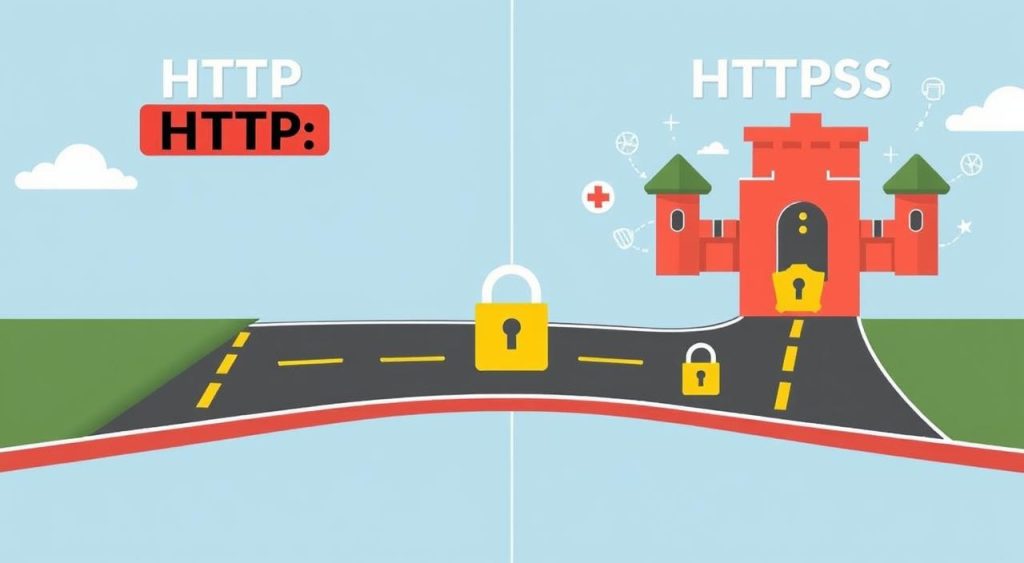Now, 95% of websites use HTTPS. This is a big jump from a few years ago. It shows how important web security and a secure website have become. HTTPS protects user data and makes sure browsing is safe.

Knowing the difference between https vs http is key for website owners. It affects your site’s security and trustworthiness. A secure site is vital for keeping user data safe. We’ll dive into web security and HTTPS’s role in making sites secure.
Key Takeaways
- HTTPS is now used by 95% of websites, highlighting the growing importance of web security.
- The difference between https and http is a fundamental difference in how data is transmitted and protected.
- A secure website is essential for building trust with users and protecting sensitive information.
- HTTPS is critical for protecting user data and ensuring a secure browsing experience.
- Understanding the difference between https and http is important for any website owner.
- Web security is a critical aspect of website ownership, and HTTPS plays a key role in ensuring a secure website.
Understanding HTTP and HTTPS Protocols
To understand HTTP and HTTPS, we need to know the basics. These protocols help websites talk to their users. They use something called an ssl certificate to keep data safe.
Web protocols have grown to be more secure over time. Now, we can send data faster and safer. Ssl certificates are key to this, keeping our online info safe.

Looking closer at HTTP and HTTPS, we see a big difference. They handle data encryption in different ways. This shows how important secure internet use is today.
| Protocol | Data Encryption | Security |
|---|---|---|
| HTTP | No | Low |
| HTTPS | Yes | High |
In the next section, we will dive deeper into HTTPS and HTTP. We’ll see how they affect website security and trust.
The Core Difference Between HTTPS vs HTTP

is very important. It’s about how data moves between a website and its users. HTTPS and HTTP are two ways to do this, but HTTPS is safer.
HTTPS adds extra security with encryption. This is key for keeping user data safe and private online.
Using HTTPS can also help your website rank better. Search engines like Google like websites that use HTTPS. This shows they care about security and privacy.
Also Read: RAM vs ROM: Key Differences Explained
This can make users trust your website more. Switching to HTTPS shows you’re serious about keeping user data safe.
HTTPS is great for keeping your online privacy safe. It encrypts data, so others can’t see it. This is super important for websites with personal or financial info.
By using HTTPS, you protect your users from bad stuff online. It stops identity theft and other cybercrimes.
Using HTTPS is an essential step in protecting user data and ensuring online privacy. By providing an additional layer of security through encryption, HTTPS helps to prevent cybercrime and improve website ranking.
How HTTPS Encryption Works
HTTPS is key for safe online talks. It adds a secure layer on top of http. This layer keeps data safe and sound.
HTTPS uses SSL/TLS certificates for security. These certificates check if a website is real. They make sure data is safe and can’t be changed.
SSL/TLS Certificates Explained
SSL/TLS certificates are the heart of HTTPS. They have the website’s public key. This key helps make a safe connection between the site and users.
The Encryption Process
Encryption is a complex process. It includes steps like key exchange and data scrambling. HTTPS uses special encryption to keep data safe.
Read More: The Difference Between Android and iOS Smartphones
Certificate Authorities and Trust
Certificate authorities are very important. They check if a website is real. They give SSL/TLS certificates for a safe connection.
Security Benefits of HTTPS
HTTPS is key for website security. It offers many benefits for a safer online experience. HTTPS encrypts user data, keeping it safe from hackers.
HTTPS is better than HTTP because it encrypts data. This makes HTTPS the top choice for online security. It keeps user data safe, making users feel secure online.
HTTPS does more than just protect data. It also stops cyber attacks like man-in-the-middle attacks. Websites using HTTPS keep their users’ data safe. This is great for businesses, as it builds trust with customers.
| Protocol | Security | Encryption |
|---|---|---|
| HTTP | None | None |
| HTTPS | High | Encryption in https |
In short, HTTPS is very good for security. It keeps user data safe, stops cyber attacks, and builds trust. HTTPS is the best choice for website security.
Impact on Website Performance and SEO
The ssl/tls protocol is key for secure website communication. It keeps data safe between a website and its users. Moving from http to https boosts security and affects website speed and SEO.
While https might slow down a page a bit, the benefits are huge. Search engines like Google favor secure sites. This means your site could rank higher, making it easier for people to find.
Using https also builds trust with users. When they see a secure site, they’re more likely to buy or share personal info. This is super important for online shops. By switching to https, you can boost trust and sales, helping your business grow.
Loading Speed Considerations
To make your site load fast, try a few things. Optimize images, shrink code, and use a CDN. These steps help your site load quickly, even with https.
Search Engine Rankings
Search engine rankings matter a lot for https. Switching to https can help your site rank better. This means more people will see your site, leading to more visitors and sales.
User Trust and Conversion Rates
User trust and sales are key for any site. Using ssl/tls and switching to https can boost both. This leads to more money and growth for your business.
Implementing HTTPS on Your Website
To keep your website safe, you need to use HTTPS. This means getting an SSL certificate. It makes your website’s connection with users secure.
Choosing the right SSL certificate is key. There are many types, like domain validation and extended validation. Each has its own needs and benefits.
Choosing the Right SSL Certificate
The right SSL certificate keeps your website safe. Make sure it comes from a trusted source.
Migration Steps
To switch to HTTPS, you need to get an SSL certificate. Then, update your website’s URL and set up your server. Do these steps carefully to avoid problems.
Common Implementation Challenges
When you switch to HTTPS, you might face some issues. These include mixed content problems and SSL certificate expiration. Fix these quickly to keep your website safe.
| Challenge | Solution |
|---|---|
| Mixed Content Issues | Update your website’s content to use HTTPS URLs |
| SSL Certificate Expiration | Renew your SSL certificate before it expires |
| Server Configuration Problems | Configure your server settings to support HTTPS |
By following these steps and solving common problems, you can make your website secure. This ensures a safe connection for everyone.
Conclusion: The Future of Secure Web Communications
HTTP and HTTPS are different in how they keep web communications safe. HTTPS uses SSL/TLS certificates and strong encryption. This makes it better for keeping online talks private and safe.
More and more big websites are using HTTPS. Search engines also like it. This shows how important HTTPS is today.
HTTPS will be even more important in the future. As online threats grow, we need stronger security. Websites that use HTTPS will keep their users safe and happy.
They will also do better in search results. This makes users trust them more.
In short, moving to HTTPS is a big step for web safety. It helps keep our online talks safe from unwanted eyes. HTTPS is the way to go for a safer internet.
FAQ
What is the difference between HTTPS and HTTP?
HTTPS is a safe version of HTTP. It adds security with encryption. HTTP does not have this extra layer.
HTTPS uses SSL/TLS to keep data safe. This means your info stays private when you’re online.
Why is HTTPS important for website security?
HTTPS keeps your site safe from hackers. It stops them from listening in or changing your data. This keeps your personal info safe.
How does the HTTPS encryption process work?
HTTPS uses SSL/TLS certificates for encryption. These certificates make a safe link between your browser and the site’s server.
They use special keys to make your data safe. This way, only you and the site can see what you send.
What are the benefits of using HTTPS on a website?
HTTPS makes your site more secure. It also makes users trust your site more. Plus, it helps your site rank better in search results.
How can I implement HTTPS on my website?
First, get an SSL/TLS certificate. Then, set up your web server for HTTPS. Make sure all your site’s content uses HTTPS.
Plan carefully to avoid problems. This keeps your site working well for your visitors.
What are the common challenges in implementing HTTPS?
Getting SSL/TLS certificates can be expensive. The switch might be hard. You might face problems with your site’s content or third-party tools.
HTTPS can also slow down your site. Test everything carefully to make sure the switch goes smoothly.



